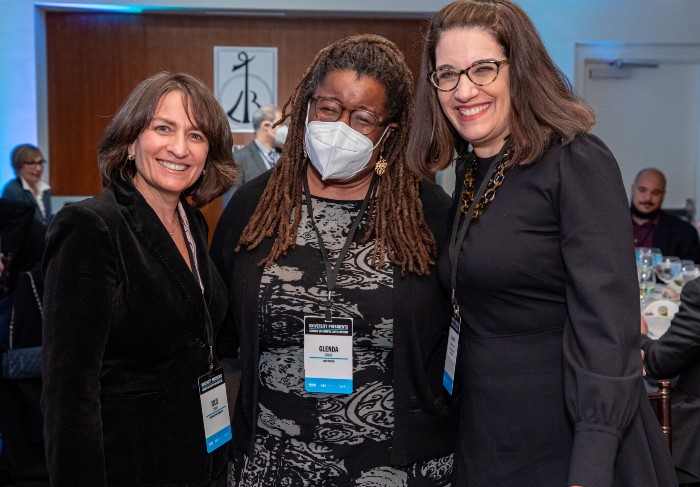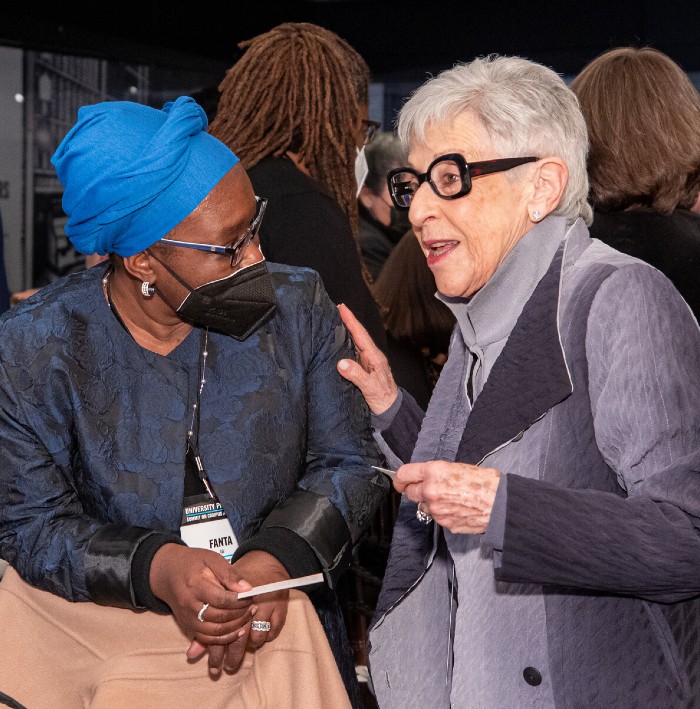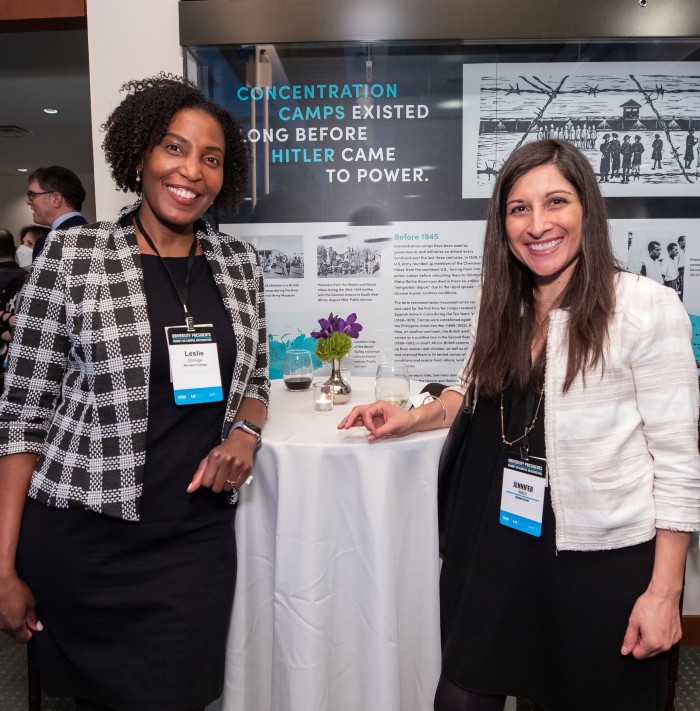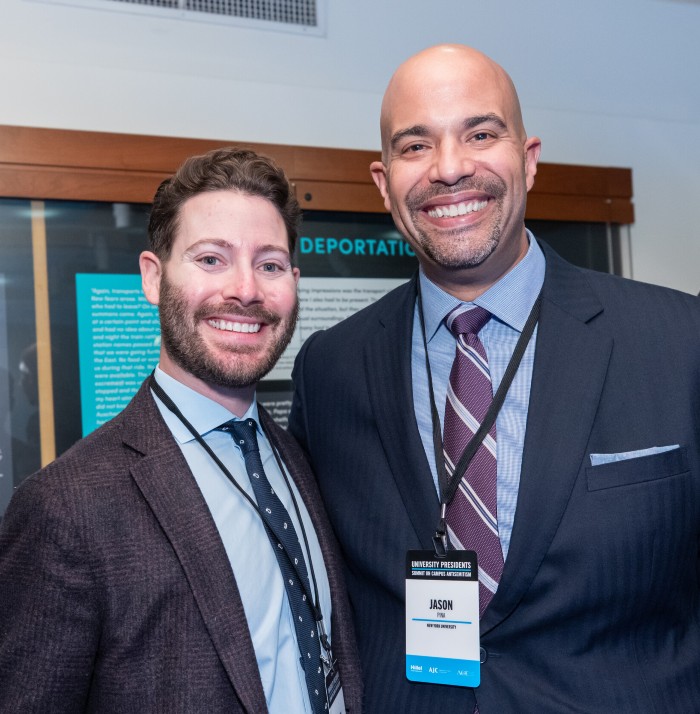 College and university presidents and diversity officers from across North America learned best practices and new tactics.
College and university presidents and diversity officers from across North America learned best practices and new tactics.
The goal of learning these best practices and new tactics was to improve the campus climate for Jewish students this week at the University Presidents Summit on Campus Antisemitism.
Presented by Hillel International and American Jewish Committee (AJC), in collaboration with the American Council on Education (ACE), the Summit helped higher education leaders grappling with the multi-faceted challenge of campus antisemitism, from how to define antisemitism to the special role of diversity officers as champions of all students experiencing discrimination.
The conference, held at the Center for Jewish History in New York City and hosted by New York University President Andrew Hamilton, included presentations from Jewish community leaders, members of Congress, and university presidents, exploring key issues in-person with one another.
Several participants shared thoughts about the challenge of addressing antisemitism on college campuses and the value of the Summit:
Lee C. Bollinger, President, Columbia University: “Antisemitic incidents on college and university campuses represent a threat to our values and our ability to create communities that respect the fundamental dignity and human rights of all members. Addressing them challenges us to take a hard look at difficult questions affecting our campus climates and our society more broadly. This Summit is a timely opportunity to examine the impact of one of the oldest and most resilient forms of hatred with trusted leaders and experts as part of larger efforts to make sure that Jewish students, and all students, feel safe, secure, and included as they pursue their educations.”
Andrew Hamilton, President, New York University: “We in this room tonight represent communities of scholars who learn from difference. We must model ways for people to co-exist and celebrate one another’s diverse beliefs and backgrounds. Our institutions espouse higher values: learning, critical thinking, and empathy. Antisemitism stems from the opposite of these values, and it is our duty to confront it.”
Anthony P. Monaco, President, Tufts University: “Colleges and universities must remain vigilant in our work to address antisemitism’s rise on campuses across the country and to foster a safe, heathy and respectful environment for all our students. At Tufts, we have been vigorous in our response, and we were happy to share our approach with other leaders in higher education. Through opportunities such as this Summit and our ongoing collaborations, we will continue to learn from each other as we seek to combat antisemitism on our campuses.”
Matthew Bronfman, Chair, Board of Governors, Hillel International, and Chair of the AJC Board of Trustees: “Jewish students expect a celebration of diversity, yet they experience attacks on what makes them unique. They expect inclusion, yet they experience isolation. They expect equity, yet they experience bullying. Your universities cannot stand for diversity, equity and inclusion selectively. The university must protect every student’s safety and each student’s right to learn. The question is when will we all do something about it? We know what to do. And our goal in the coming sessions is to share what works: the tools that are available to use right now, and the tools that protect academic institutions from hatred of all kinds.”
David Harris, CEO, American Jewish Committee: “We must take antisemitism as seriously as any form of racism. There is not a hierarchy. To us, all of this is a violation of the promise of America and the spirit of the campus. There is a serious problem of antisemitism on some college campuses today. The more we can convene to discuss antisemitism and share best practices, the more effective we will be in confronting the issue, which affects not just Jewish students, but the very purpose of an American university.”
Adam Lehman, President, and CEO, Hillel International: “For many years, Jewish students have not been considered by universities to be a particularly vulnerable or marginalized group. In fact, one of the most insidious stereotypes Jewish students face today is that they are part of a uniformly white, rich, privileged group whose experiences with antisemitism, bullying, and marginalization are just not that important, relative to the more urgent tasks of confronting racism and victimization of other minoritized groups. Our appeal to you today is not to ignore or reduce your deep commitments to fighting racism, gender-based discrimination, and all other forms of inequity and injustice. It is simply to see our Jewish students – in all of their diversity — as also fully deserving of your attention and concern.”
Sean Garrick, Vice Chancellor for Diversity, Equity, and Inclusion, University of Illinois Urbana-Champaign: “Universities are where we go to create the next generation of society — to prototype the future. If you don’t invite everyone to that enterprise in a way where they can be their whole selves, you don’t get the best outcome. You might think we’re doing the work of this conference for Jewish folks, but we’re doing this for ourselves. It’s a matter of what we want our society to be. If you see one group being disenfranchised and left behind, what does it say about us? Not that we are a rich multicultural society, but that we are a society that picks winners or losers.”
Ted Mitchell, President, American Council on Education: “We are here on a mission and that mission is to eradicate antisemitism. Our hope is that you will leave here equipped with strategies and tactics that you can customize to meet the needs of your own unique campus environment. We aim to strengthen the ties between college and university leaders and the Jewish community to foster a mutually supportive and trusting environment when crises occur, and ensure a positive, welcoming environment on campus for Jewish and pro-Israel students.”
Rep. Lee Zeldin, U.S. House Bipartisan Task Force for Combating Antisemitism: “You as a university president have the responsibility for all the faculty and all the administration. If just one goes rogue and isn’t being helpful to that student who needs mentorship, that can be a stain on the entire campus. There’s a lot that’s on your plate but that you’re here is extremely impressive.”
Rep. Grace Meng, U.S. House Bipartisan Task Force for Combating Antisemitism: “Throughout this battle of trying to combat hate against Asian-Americans, it’s Jewish leaders who have held the hands of the Asian-American community, from drafting legislation, pushing the bill, to addressing issues like the data collection. How are we supposed to fix something if no one knows that it’s happening?”



Hillel International
Founded in 1923, Hillel has been enriching the lives of Jewish students for more than 90 years. Today, Hillel International is a global organization that welcomes students of all backgrounds and fosters an enduring commitment to Jewish life, learning, and Israel. Hillel is dedicated to enriching the lives of Jewish students so that they may enrich the Jewish people and the world. As the largest Jewish student organization in the world, Hillel builds connections with emerging adults at more than 550 colleges and universities and inspires them to direct their own paths.
American Jewish Committee
American Jewish Committee (AJC), based in New York, with 24 regional offices across the United States and 13 posts around the world, is the premier global Jewish advocacy organization.
Founded in 1906, AJC combats antisemitism and other forms of hatred and extremism through pioneering advocacy and engagement with government, faith, education, and civic and media leaders.
For more information, visit AJC.org and follow on Facebook.com/AJCGlobal and Twitter.com/AJCGlobal
ACE
ACE is a membership organization that mobilizes the higher education community to shape effective public policy and foster innovative, high-quality practice.
As the major coordinating body for the nation’s colleges and universities, our strength lies in our diverse membership of more than 1,700 colleges and universities, related associations, and other organizations in America and abroad.
ACE is the only major higher education association to represent all types of U.S. accredited, degree-granting institutions: two-year and four-year, public and private.
For more information, please visit www.acenet.edu or follow ACE on Twitter @ACEducation.
Photo credit: 1-4) Hillel International.
Become a Harlem Insider!
By submitting this form, you are consenting to receive marketing emails from: . You can revoke your consent to receive emails at any time by using the SafeUnsubscribe® link, found at the bottom of every email. Emails are serviced by Constant Contact








